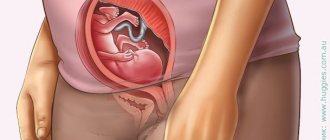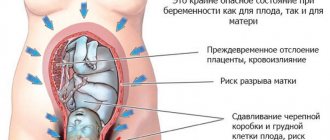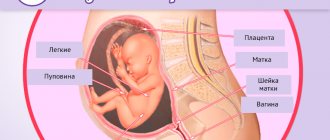You are already at 29 weeks! From this moment your life can change significantly.
By and large, now you already live only for him. Everything revolves only around the upcoming birth.
The husband is needed more for moral support and tying shoelaces. I stopped worrying about work altogether. A state of clumsiness and constant fatigue interfere with a normal existence, but you must remember what all this is for and continue to move forward.
Fetal development
In the remaining time before birth, internal organs continue to mature and prepare for independent existence.
This is what your baby looks like at 29 weeks
The skin has formed, the layer of subcutaneous fat has increased significantly. The amount of cheese-like lubricant is reduced, and the skin is partially cleared of vellus hair.
The baby's activity increases significantly in response to the voices of mom and dad, he recognizes them.
By this time, the baby should already be in the uterus in the position from which it plans to be born.
The fetal muscles have become stronger, and its movements cause pain to the mother.
But it’s too early for him to be born - his lungs are not yet able to cope with breathing on their own.
Special changes occur in internal organs:
- Liver cells mature and arrange themselves in the order characteristic of a mature organ. The organ is preparing to perform its function;
- the adrenal glands begin to actively produce substances similar in structure to androgens;
- the formation of the pancreas ends, it supplies the baby with insulin in sufficient quantities;
- The fetus independently controls its body temperature.
Nerve connections continue to improve - the baby is more awake than before, and, as a rule, the mother always knows when the baby is not sleeping.
The baby's height and weight increase significantly; during the entire third trimester, he can become five times heavier.
The baby's movements become more conscious - he sucks his finger, scratches himself behind his ear, smiles, sticks out his tongue.
Baby at 29 weeks of pregnancy
There is a 90% chance of surviving premature birth this week.
The immune system and heat regulation started working. The digestive system is ready to digest food. The baby's kidneys excrete up to 500 ml of urine into the amniotic fluid daily. The mucus plugs have disappeared from the nose, so amniotic fluid enters the baby's stomach and through the nose. He distinguishes taste, smell, light and darkness.
The baby's gaze can already focus on something. There are eyelashes on the eyes and eyebrows on top. He's already dreaming!
Your baby is 39 cm tall and weighs about 1.2 kg. Adipose tissue has increased to 4% of body weight and the baby’s cheeks may become plump, the skin smoother and less transparent. The enamel is laid on the teeth.
Ultrasounds are not performed at week 29 (unless the mother’s well-being requires it). The study could show future parents a full-fledged baby, its movements, facial expressions. It will also show the condition of the placenta, the volume of amniotic fluid and the condition of the umbilical cord.
Ultrasound at 29 weeks of pregnancy
Ultrasound at this time is not a mandatory study and is prescribed when controversial issues arise.
During the procedure, the size of the fetus, its individual parts, the condition of the organs, their relationship with each other, blood flow in the mother-placenta-fetus system, the condition of the placenta and cervix are assessed.
The nature of pain at 29 weeks of pregnancy
The 29th week of pregnancy is the beginning of the first week of the 8th month of pregnancy, because the obstetric month differs from our usual one and is 28 days or 4 weeks.
At this moment, important changes occur in the body of the woman in labor and the fetus, some of which can lead to discomfort or pain. During this period, intensive fetal growth occurs. By this time, its height can be about 38 cm, and its weight is about 1200 g, or even more. Every day intensive development occurs, the limbs become stronger, stronger, and the tremors become more and more noticeable, there are fewer and fewer places for “tumbling” in the mother’s waters, and pain at the 29th week of pregnancy, from this point of view, is quite understandable.
At the 29th week of pregnancy, the baby already has a fully formed digestive system, which, in principle, is already ready to assimilate our earthly food. The circulatory system is working intensively, and the blood has already stabilized its composition. The excretory system begins to work powerfully, the kidneys are already successfully filtering the blood, and the baby is already urinating in the mother’s amniotic fluid.
Every day he excretes a fairly large dose of urine - about 500 ml. Naturally, all the care of processing and disposal falls on the mother’s body, which “serves” not only itself, but also the baby. This is the milestone - 29 weeks pregnancy. A stomach ache is a standard complaint of a pregnant woman at this stage.
But it should be noted that there are different pains, and the reaction to them should be different.
The simplest and most understandable pain in the abdomen occurs due to digestive disorders, which occur quite often in the expectant mother.
The digestive system, due to the growth of the fetus and stretching of the uterus, is in a “pressed” state, so constipation is common.
A woman in labor should balance her diet, consume more fiber, vegetables and fruits, then she can reduce the likelihood of such pain.
29 weeks of pregnancy, lower back pain - this symptom is typical for all women in labor. This uncomfortable sensation occurs because the total body weight increases, the woman’s center of gravity shifts, and therefore the load on the spine increases, especially in the sacral area.
The expectant mother should pay attention to her posture, gait, avoid making sudden movements, wear comfortable shoes, use a prenatal bandage and rest more often, lying on her side, relieving the load on the spine. More and more physical work around the house needs to be delegated to relatives.
It is also necessary to control your weight; it should not exceed established standards. The increase in it should not exceed 50 g per day or 350 g per week.
If a woman greatly “exceeds the norm,” then she should contact a specialist who is supervising her, who will help her create the right diet.
It is important for the mother in labor and her loved ones to know that intensifying and ongoing pain in the lower abdomen, which is accompanied by bloody discharge or breaking of water, at the 29th week of pregnancy is an alarming symptom. You should immediately seek medical help and call an ambulance.
In the third trimester, which is the 29th week of pregnancy, a woman in labor may experience rhythmic pain, which is accompanied by weak contractions of the uterus.
This is a manifestation of the training mechanism inherent in nature: in this way, the woman is prepared for future childbirth. Such contractions and pain are not dangerous, and in the scientific world they are called Braxton-Higgs contractions.
Therefore, if at 29 weeks the lower abdomen feels tight, this may also be a sign of training contractions.
Stringing pain at the 29th week of pregnancy can occur in a woman in labor with so-called uterine hypertonicity. The fact is that the muscular wall of the uterus is already in constant tension - tone.
If the tension is very strong and does not subside, the uterus seems to “turn to stone” - this is a sure sign of uterine hypertonicity. There are cases when such conditions lead to miscarriage or premature birth.
Let all processes occur normally, in due time, so you should immediately consult an obstetrician. With the modern development of medicine, such conditions are easily resolved safely.
The expectant mother may experience rhythmic shuddering and abdominal pain, which can be explained very simply - the baby is hiccupping. In this case, there is no need to worry because the hiccups should go away quickly.
Pregnant women in the third trimester may experience itching on the skin of the abdomen. Most often, this is not a cause for concern, because the reason is simple - the skin of the abdomen stretches due to its growing size. You just need to help the skin stretch by applying moisturizers or plain olive oil. In this case, you can even avoid the so-called stretch marks, which most women do not like.
If a woman at 29 weeks has lower back pain, or so-called “flying” pain appears, which is accompanied by pain in the sacrum, pelvis and radiating to the legs, then you can rest assured - at this stage of pregnancy such pain is quite typical, and it is caused by softening of the joints pelvic bones, because during childbirth they stretch significantly.
Therefore, at this stage, the expectant mother should pay due attention to a diet rich in calcium. Moreover, the baby “takes” about 250 mg of calcium from the mother every day. If such pain does not go away, but becomes even stronger, then you need to contact your obstetrician.
Perhaps the woman in labor develops symphysitis - significant stretching and inflammation of the pelvic joints.
At 29 weeks of pregnancy, the baby’s senses are already functioning. He distinguishes tastes, sees light and hears well. Therefore, wise mothers already at this time talk to the baby, “caress” him, stroking his belly, and let him listen to good music. But the most interesting thing is that the child reacts to this. During calm music, he falls asleep; when stroking his stomach, he can move his head.
29 weeks of pregnancy is quite a long period, but it is worth considering that there are still 12 weeks before giving birth.
The more natural the process, the better! Therefore, both the woman in labor and her relatives should be vigilant to the appearance of pain and distinguish between typical pain and atypical pain.
In any case, if the nature of the pain is unknown, you should immediately consult a doctor. Following these simple rules will help maintain the health of both the expectant mother and her ripening fetus.
Source: https://www.pinetka.com/beremennost/shkola-buduschih-mam/priroda-boley-na-29-nedele-beremennosti.html
What happens in your body at 29 weeks?
The belly continues to grow and increase in size. A large uterus puts pressure on the abdominal organs, which aggravates constipation. It also presses the stomach against the diaphragm - heartburn appears and breathing becomes difficult.
A heavy chest increases the load on the shoulder girdle, and by the evening it results in discomfort in the spine and neck.
It takes two people to breathe, the heart also works at an increased rate - mom feels an almost constant feeling of fatigue. Appetite also increases, urination becomes more frequent.
The nipples become rougher, the halos become darker. The breast produces colostrum, although in small quantities.
If suddenly you are faced with such a nuisance as urinary incontinence when coughing and sneezing, you can start doing Kegel exercises. They will help strengthen your pelvic floor muscles.
How you feel at 29 weeks
The internal feeling of happiness can also be overlapped by anxiety, fear of the upcoming birth. Don’t be afraid to talk about it - you can always find a listener, if not your husband, then your mother, if not your mother, then your friend. You can meet the same pot-bellied lady in the park - you will have something to talk about.
Listen to your baby's movements - by their intensity and strength you can always determine how he feels and what he wants at that moment.
Keep an eye on your sensations - increasing swelling of the limbs is not a very good prognostic sign - you need to inform the doctor about this and arrange a fasting day.
Discharge from the genital tract
Light, moderate discharge with a slight sour odor is considered normal. If you suddenly find copious liquid yellowish discharge, this could be amniotic fluid, especially if such discharge was preceded by sudden movements or a blow to the abdominal area.
Thick yellow or green discharge with an unpleasant odor indicates the development of an infection in the vagina. It is impossible to cope with this on your own. Such discharge disappears only after using medications - these are most often local suppositories and tablets. Douching with medications during pregnancy is contraindicated.
Discharge at 29 weeks of pregnancy
In the third trimester, a woman should especially carefully monitor her health; if her health changes, she should consult a doctor. Some dangerous symptoms may appear in the form of vaginal discharge. Thus, thin, watery leucorrhoea often indicates the onset of premature labor.
Leakage of amniotic fluid is a dangerous sign indicating damage to the membranes. This condition can harm the baby. Blood should also cause concern - it is a sign of many serious complications - previa, placental abruption.
Normally, leucorrhoea should be homogeneous, not liquid like water, without extraneous aroma or shades. Light or light milky leucorrhoea is considered a normal variant. Otherwise, you need to consult a doctor.
29 weeks is how many months?
This period is seven full obstetric months and one week. If you calculate the period based on a regular calendar month - 29 weeks - 6 months and 3 weeks.
Over such a long period of time, a woman’s well-being may change. Due to weight gain, pain in the back and legs may appear. This period is dangerous because premature labor may begin. In this regard, if pain or foreign secretions appear, you should call a doctor.
Photos of bellies at 29 weeks
Examinations at 29 weeks
The following measurements are required:
- measuring blood pressure in both arms;
- weight measurement with assessment of total gain and weekly gain;
- Using a stethoscope, the child’s heartbeat is listened to, its frequency and rhythm are assessed.
And you will again have to take a urine test - based on the results of which the doctor will be able to determine how the body of a pregnant woman functions.
Nutrition at 29 weeks of pregnancy
Expectant mothers are aware of the danger that food allergens pose to the fetus. However, according to some researchers, women should not completely exclude them from their diet - otherwise in the future it will be much more difficult for the child to resist various allergic diseases. Of course, there is no need to overindulge in citrus fruits, strawberries, or sweets while you are expecting your baby (including at 29 weeks) - you don’t want your child to be born with allergies?!
Is it possible to eat nuts during pregnancy? Until recently, such strong allergens as peanuts and pine nuts were considered extremely undesirable foods in the diet of pregnant women. Now, as a rule, doctors do not object to their use in small quantities, since they represent a complex of various nutrients that have a beneficial effect on the body of both mother and fetus.
Risks at 29 weeks
As the fetus grows, the risk of cervical dilatation and premature birth increases. Therefore, be sure to wear a bandage, even at home, if you plan to do household chores or walk outside with your child. Try to avoid traveling and walking long distances.
The reduced immunity of pregnant women always leaves the opportunity for bacteria and viruses to cause an inflammatory process - do not forget about maintaining personal hygiene, avoid large crowds of people so as not to catch a respiratory infection.
Condition of the fetus at 29 weeks of pregnancy
By the 29th week, the baby’s height reaches 26 centimeters, weight ranges from 1300 to 1500 grams. The problem is that the fetus already feels a certain discomfort due to lack of space in the womb, and this process is also felt by the pregnant woman. The expectant mother begins to notice not the somersaults and flip-flops of the baby, but his kicks with his arms and legs, and quite strong ones at that. There are cases when the baby’s movements are so active that serious tubercles appear on the abdomen at the moment when the fetus is too actively trying to expand its space.
As for the formation of the baby itself, the main distinguishing feature of the 29th week is that the immune system is finally formed and even in the case of premature birth, the baby has a very high chance of survival, of course, with proper care.
Many pregnant women do not understand why they need to constantly run to the toilet to relieve themselves; the fact is that at the 29th week, the formed and functioning kidneys of the unborn baby secrete about ½ liter of urine.
Important at 29 weeks
Try not to burden your already working body to the limit. Perform only those actions that do not require a large amount of energy. You can wash the dishes and cook the food yourself, but let your husband do the shopping. He will help you hang out the laundry and beat out the carpet.
It's time to change your wardrobe once again - everything from socks to outerwear should be comfortable and not restrict your movements.
If you are still working, treat yourself to a cool foot bath, and your husband can give you a foot massage, this will help relieve swelling and discomfort.
If you still haven’t made a list of necessary things, now is the time; it will help your family buy a dowry for your baby while you are in the maternity hospital
Nutrition at 29 weeks
A pregnant woman's diet should consist of easily digestible, well-heat-treated food. It is necessary to reduce the consumption of fatty, fried and spicy foods. Instead, you can please yourself with dried fruits, nuts, and yoghurts. It is no less tasty, but more healthy.
Alcohol, fast food, canned factory products, soda and exotic foods are still prohibited (if your diet before pregnancy was not rich in seafood, you should not introduce them now - it is possible to provoke an allergy in the baby).











